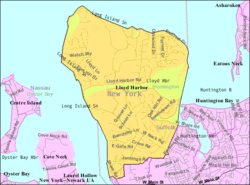Lloyd Harbor, New York
| Lloyd Harbor, New York | |
|---|---|
| Village | |
| Incorporated Village of Lloyd Harbor | |
 U.S. Census |
|
| Location within the state of New York | |
| Coordinates: 40°54′36″N 73°27′25″W / 40.91000°N 73.45694°WCoordinates: 40°54′36″N 73°27′25″W / 40.91000°N 73.45694°W | |
| Country | United States |
| State | New York |
| County | Suffolk |
| Area | |
| • Total | 10.6 sq mi (27.5 km2) |
| • Land | 9.3 sq mi (24.2 km2) |
| • Water | 1.3 sq mi (3.3 km2) |
| Elevation | 138 ft (42 m) |
| Population (2010) | |
| • Total | 3,660 |
| • Density | 340/sq mi (130/km2) |
| Time zone | Eastern (EST) (UTC-5) |
| • Summer (DST) | EDT (UTC-4) |
| ZIP code | 11743 |
| Area code(s) | 631 |
| FIPS code | 36-43005 |
| GNIS feature ID | 0955762 |
| Website | www |
Lloyd Harbor is a village in Suffolk County, New York, United States, on the North Shore of Long Island. As of the 2013 census, the village population was 3,677. The Incorporated Village of Lloyd Harbor is located in the town of Huntington. It is a village known for its natural beauty and quaintness. According to BusinessWeek, Lloyd Harbor is the 14th wealthiest town in America.
In 1654, the Matinecock Native Americans sold 3,000 acres (12 km2) of what is now called Lloyd Neck to English settlers from Oyster Bay. The Matinecock referred to the region as Caumsett ("place by sharp rock"). In 1676, James Lloyd acquired the neck, which was then taken over by his son Henry. Henry Lloyd farmed the land and erected a house, which still survives in Caumsett State Park. After his death in 1763, his son Joseph built the Joseph Lloyd Manor House, which he was forced to abandon by the British during the Revolutionary War. The British built several fortifications in the neck, including Fort Franklin. Henry Lloyd IV was the last Lloyd to own the estate, in 1841. In the 1880s, it became a stop for steamboats coming from New York City, bringing tourists and wealthy New Yorkers.
In 1885, Lloyd Neck, which was then part of the town of Oyster Bay and had earlier been known as Queens Village, seceded from Queens County and became part of the town of Huntington in Suffolk County.
The 1900s ushered the era of the Long Island Gold Coast, and various wealthy families began to buy land and build seaside mansions and estates. These included William Matheson, Marshall Field III, Ronald Conklin, Harold Dimppel, Sr., Ferdinand Eberstadt and George McKesson. In 1926, Lloyd Neck and West Neck became incorporated as a municipality which was named Lloyd Harbor. Charles Lindbergh, Jerry Seinfeld and Billy Joel have each lived on the Neck for a time. Currently many of these estates have been adapted for other uses. Marshall Field III's estate is now Caumsett State Historic Park, and the Conklin estate is a Roman Catholic seminary. Others have become a county park and a wildlife refuge. Charles Robertson's estate is now the Banbury Center, a small conference center of Cold Spring Harbor Laboratory.
...
Wikipedia

